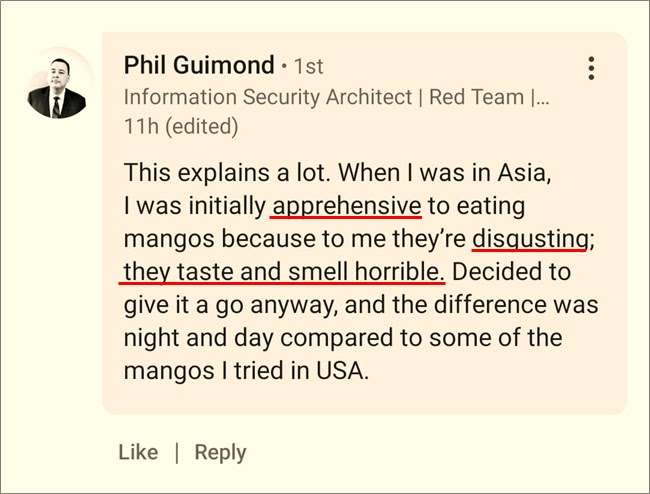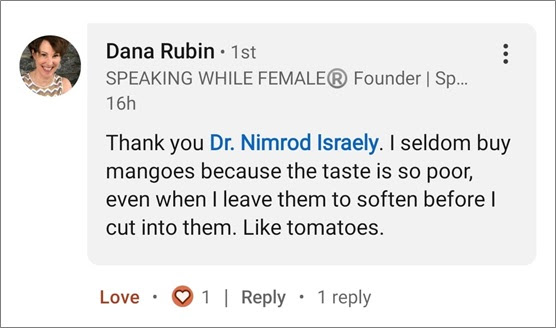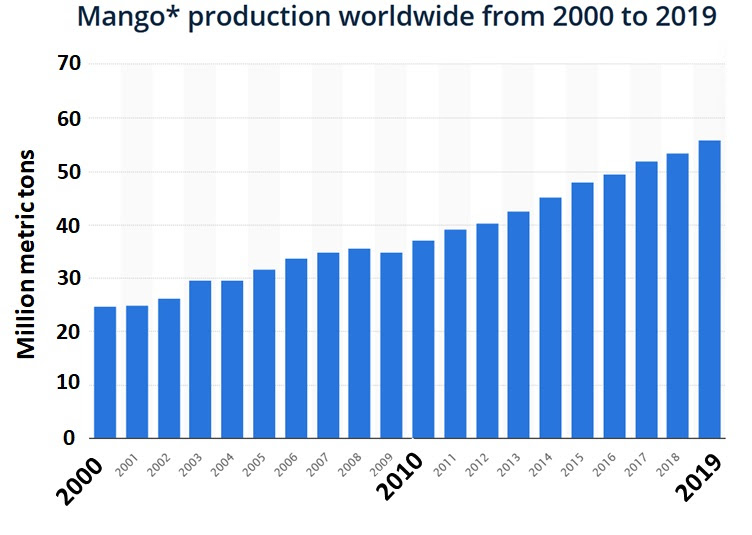HOW CAN WE USE EMOTIONS TO INCREASE ECO-FRIENDLY FOOD PRODUCTION AND FIGHT POVERTY?

BY DR. NIMROD
Happy or sad, we use Food to express, with no words, our emotions, feelings, and even to relive memories from old times.
This article is triggered by emotional responses to a post I published on LinkedIn.
I was merely discussing the “technical quality issues” of mangos when the discussion became very emotional.
No wonder; FOOD generates EMOTIONS.
Here I focus on how we can harness the power to fight poverty while increasing food production, business activities and improving our health and that of the environment.

In profession, Phil is an “Information Security Architect,” a very “logical” job. Still, when he describes his USA mango eating experience, he uses words that express Feelings and Emotions – Apprehensive, Disgusting, and Horrible.
Then Phil shortly describes his Asian mango experience – “the difference was night and day…”. “Night” represents the Mango experience in the US and “day” (the opposite) in Asia.
If Apprehensive, Disgusting, and Horrible represent the “night,” then Assured, Satisfied, Attractive, Delight, Appealing, Pleasant, Delightful, Wonderful, Enjoyable, must be representing the “day.”
Naturally, Phil wouldn’t pay for mangoes that would trigger bad feelings and emotions, but he would gladly do so for mangoes that would make him feel good about himself and his actions.
Like Phil, Dana is also unhappy with the taste of US mangoes.

IMPORTANT NOTE – Both(!) of them do not mention the price but only the taste as the cause for stopping buying Mangoes.
For all people, food-related activities, such as eating, smells, and tastes can easily trigger emotions and feelings.
Prof. Daniel Kahneman, the Israeli Nobel Prize winner in Economic Sciences, is a psychologist known for his decision-making and behavioral economics work.
Kahneman showed that “Feelings” are a form of thinking (he named it System one), which controls our “Rational thinking” (System two).
Ask yourself –
Q. What would make consumers buy more mangoes, even for a premium price!?
A. Anything that would generate positive emotions and feelings.
Q. What would generate “positive emotions and feelings?”
A. A delightful appearance, smell, and taste of the mangoes. We can further increase satisfaction and sales by relating it to consumers’ values (remark, “Values” are excellent generators of emotions and feelings).
Q. Any specific Values?
A. Global Values that most consumers in the target markets (developed countries) care about. This includes Poverty, Hunger, Equality, Health, Environment, and Global Warming.
Q. Is it possible to link those Values to mangoes?
A. YES, as you will soon see!!
Q. How???
A. Imagine that consumers buy a particular mango brand knowing that it is always – tastier and with a better appearance and smell than the others.
But that is not all! Imagine that consumers get to know that the mangoes they enjoy eating were grown by poor smallholders, without any sprays (zero!). Meaning the health of farmers, consumers, and the environment is protected.
But that is not all! The consumers will also learn that farmers in Africa (or other emerging economies) increase their annual income by 50% every year! Meaning they transform from Poverty to Prosperity.
Q. That sounds great! But is it realistic or even possible?
A. YES! It is already performed and practiced!
Q. Where?
A. In Africa.
Q. Please extend…!?
A. We are talking about the Green Valley business-oriented concept. Green Valley aims to simultaneously answer some of the most urgent global challenges and concerns.
Q. Can you give an example as to the global challenges Green Valley deals with?
A. Sure. Green Valley is a holistic approach and impacts most SDGs, but mainly Poverty, Hunger, Health, and Environment.
Q. And that’s all?
A. Not at all. Green Valley is not based on charity or donations, so farmers get to improve their livelihood and be proud of what they do, knowing they can support their families.
Q. Please elaborate on how Green Valley does it?
A. Green Valley Package uses innovative (tested and field-proven) technologies and protocols wrapped in a novel business model. This enables it to work with a variation of mango growers, even the poorest who earn less than 2$ per day. Then Green Valley helps them grow the best quality, increase the yield, harvest the tastiest mangoes, and all this without sprays.
Green Valley then helps those farmers export the mangoes to premium markets to increase their income. Here it is in short –
lVl. POVERTY& HUNGER – Green Valley mangoes are grown by smallholders in emerging economies, most of which live in poverty. Working with the Green Valley project, they increase their income by 50% to 500% already in the first year!
lVl. HEALTH & ENVIRONMENT – There is no use of pesticide sprays or other chemicals. Thus Green Valley mangoes prioritize and protect the health of farmers, consumers, and the environment.
lVl. GLOBAL WARMING – Green Valley farmers do not need to use tractors and sprayers that pollute the environment, and they have an incentive to keep their trees and even plant more. This way, Green Valley directly reduces carbon emissions and fight global warming.
Q. You spook about Values, but what about the lousy Taste that Phil and Dana complained about?
A. Green Valley made it its business to make sure consumers will enjoy the original and natural perfect taste of mangoes, as it is in the country of origin when mangoes are harvested at the best time.
lVl. TASTE – Mangoes are harvested at the optimum time to provide consumers the maximum joy of a good taste experience. (See below why this is not possible today).
Q. Please remind me how all that is related to selling more mangoes at a premium price?
A. Green Valley connects the Mango growing process and its quality (Appearance, Smell, and Taste) to consumers’ considerations and decisions to buy.
Consumers weigh their expected enjoyment from the product/service in the purchasing process against the expected cost.
In the process of “weighing” food products, i.e., mangoes, we give great weight to how we will feel when we eat the Mango and the feelings, emotions, and memories it would evoke in us. Like Food, Values generate emotions that will determine if we will or will not buy a product, e.g., due to Values, many people don’t eat meat.
WHY ARE SOME USA MANGOS NOT SO TASTY?
Although both Phil and Dana are from the USA, the problem of Mango’s bad taste and low quality is a global one and not restricted to USA consumers.
 |
In the article “Why Asking ‘Why’ Will Change Your Life?“ I discussed The Root-Problem that is responsible for and causes the Mangos’ low-quality global problems.
If you guessed that the key reason is Fruit Fly pests, then you are 100% correct.

In short, farmers and exporters are afraid of fruit fly infestation in exported mangoes, which may cause an export ban.
They deal with that risk by repeatedly spraying and early harvesting the mangoes before fruit flies attack and infest them.
The critical problem of the above actions is that mangoes are often harvested when they are so green and immature that they are often not tasty for humans.
As if this is not enough, the early harvest doesn’t entirely prevent infestation (should be 0%), so too often, infested fruits get to the markets.

“Fruit fly larvae have been detected from mangoes harvested in 6 orchards but regulations have made it impossible to fumigate.” Source
There are two significant differences between Mangos imported to the USA versus those imported to the EU:
1) Most mangos imported to the USA are sourced from large-scale, “professional farmers” in Latin America. In contrast, EU mangoes are also imported from Africa, where most farmers are unprofessional smallholders (less than 1 hectare).
2) USA plant protection authorities demand Hot Water Treatment (HWT) as a bio-security measure to prevent fruit flies. This includes dipping the mangoes in hot water 115 F (46 C) for 65 to 110 minutes. In other words, the Americans consume practically “cooked” mangoes. The EU still does not have this requirement, although considering it as well.
LEARNED LESSONS AND IMPACT
We learned that: (a) Fruit flies are a global problem, which (b) Impacts both professional farmers and smallholders, (c) The authorities do not want farmers to spray, and (d) Simultaneously require zero fruit fly infestation.
As a result: (a) Currently, mangos are harvested pre-mature, and hence (b) Lack the potential to look, smell and taste as good as they do when harvested on time, even when not treated by HWT protocol.
Today, to battle fruit flies, we compromise –
Health/Environment – farmers control fruit flies by spraying, compromising their health, and damaging the environment.
Income/Poverty – even after using current control measures, i.e., sprays, traps, and sanitation, most African/Asian mango growers lose 50% of their yield to fruit flies.
Hence, they act under a full or partial export ban, which means they can only sell their produce on the local market for a lower price.
The accumulated impact of this is the low income per hectare, e.g., 500 €, while in countries that manage fruit flies well, e.g., Israel, the income per hectare is 50,000 €. In short, the income per hectare of smallholder mango growers in emerging economies is as little as 1% to 3% versus advanced growers’ income.
Bio-security – although the extensive use of numerous control (e.g., sprays, traps, and SIT) and post-harvest measures, fruit flies continue to be found in fruits entering the importing countries, hence compromising the integrity and future of their agro-industry. This may lead governments to increase the use of the Import Ban regulations.
Consumers’ satisfaction – the overall quality of exported/imported mangoes is often low, impacting consumers’ experience and satisfaction. Hence, consumers buy fewer mangoes, and some (like Phil and Daana) entirely refrain from buying.
Revenue – unsatisfied consumers, or those repeatedly experiencing low-quality mangoes and feeling disappointed, like Phil and Dana, stop buying. That results in a chain reaction, NO BUY ⇒ NO PAY ⇒ NO REVENUE. However, a good experience, like Phil had in Asia, can get disappointed consumers to try again.
Such a situation destroys the whole mango industry and the supply chain starting from the farmers, which in Africa and Asia are primarily poor smallholders!

To summarize:
(a) Mangos are grown by hundreds of thousands of farmers and serve as the primary source of livelihood for millions.
(b) Worldwide mango demand and production is growing.
(c) While the average fruit fly infestation is over 50% in Africa and Asia, the overall income loss is over 90% from its potential.
(d) Fruit flies’ bio-security issues impact mangos’ quality imported to the US, EU, and other premium markets. This brings many consumers to dislike mangos and refrain from consuming them. In short, the mango industry is facing an ongoing market failure.
EMOTIONS & FEELINGS
Many consumers say loud and clear that:
They do not like the taste, smell, and overall quality of the currently available mangoes.
They don’t like the fact that farmers spray the mangos.
They don’t like to see farmers in poverty.
They don’t like answers saying there is no solution to the above situation and its problems.
How do retailers answer those public accusations/demands?
Unfortunately, until now, they can not provide any good answers.
Unlike the retailers, we at Green Valley;
“We feel your pain and hear your demands, and we agree with all of it!
Now, let’s work together to bring the necessary CHANGE!
In this “New Dea” concept, we will make all to keep being “connected” with your demands, while you make sure to support us in our activities.”
Green Valley has an answer to “Consumers demands” – it is detailed, people-oriented, tested, and straightforward.
The challenges Green Valley deals with involve people living in poverty – like the farmers and people who live in prosperity – like the consumers.
Green Valley, through Mangoes, practically connects farmers in poverty and prosper consumers.
The magical MIX of Poor farmers, Prosper consumers, Health & Environment issues, and Food (fresh, healthy produce) is most promising to generate positive Emotions and Feelings of satisfaction.
Yes, everything Green Valley is doing is EMOTIONAL; for me, my team, farmers, partners, and consumers.
Who are we, if not Emotional Creatures?
We are “emotional,” and we are proud of it, and we let it leads us in our business and activities to do good.
It is a fact that for the first time in history, it is now possible to answer public demands and bring the unique and unconventional CHANGESwe could only dream of until now.
It should not come to you as a surprise when people choose to buy tasty, aromatic, zero-spray, fresh mangos grown by smallholders’ instead of the common not tasty, smelly, green, industrial ones.
The tasty Green Valley mangos generate positive emotions that consumers would like to repeat and experience repeatedly. We, therefore, must make sure not to disappoint them.
I wrote this article starting with the story of two people who shared their bad experiences of eating low-quality mangos.
A Moroccan friend who has now lived in Germany for over 40 years once told me that he is buying mangos as “a treat” to remind him of home and share it with his children. He also shared his deep disappointment every time the mangoes are not tasty and smell bad.
Hence, Green Valley’sjob is to provide people the opportunity to relive happy memories while creating new ones knowing the exotic place where the Mango they eat came from and how it was grown.
I invite you to step up and become an active business partner or investor in Green Valley’s projects and its grand vision.

